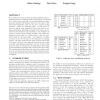Free Online Productivity Tools
i2Speak
i2Symbol
i2OCR
iTex2Img
iWeb2Print
iWeb2Shot
i2Type
iPdf2Split
iPdf2Merge
i2Bopomofo
i2Arabic
i2Style
i2Image
i2PDF
iLatex2Rtf
Sci2ools
116
click to vote
VLDB
2007
ACM
2007
ACM
The Boundary Between Privacy and Utility in Data Publishing
We consider the privacy problem in data publishing: given a database instance containing sensitive information “anonymize” it to obtain a view such that, on one hand attackers cannot learn any sensitive information from the view, and on the other hand legitimate users can use it to compute useful statistics. These are conflicting goals. In this paper we prove an almost crisp separation of the case when a useful anonymization algorithm is possible from when it is not, based on the attacker’s prior knowledge. Our definition of privacy is derived from existing literature and relates the attacker’s prior belief for a given tuple t, with the posterior belief for the same tuple. Our definition of utility is based on the error bound on the estimates of counting queries. The main result has two parts. First we show that if the prior beliefs for some tuples are large then there exists no useful anonymization algorithm. Second, we show that when the prior is bounded for all tuples th...
Related Content
| Added | 09 Jun 2010 |
| Updated | 09 Jun 2010 |
| Type | Conference |
| Year | 2007 |
| Where | VLDB |
| Authors | Vibhor Rastogi, Sungho Hong, Dan Suciu |
Comments (0)

